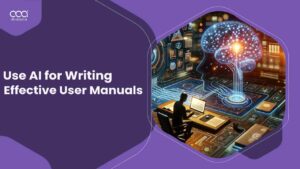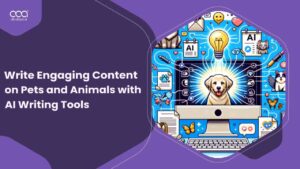In the evolving landscape of literature, science fiction has always been a frontier for exploration and innovation. Using the best AI writing tools, the genre is experiencing a renaissance, offering writers novel ways to craft their narratives.
In this article, I will show you how to write science fiction using AI writing tools in Brazil. Whether you’re a seasoned writer or someone who just writes fiction on the weekends, this article is for you!
How to Write Science Fiction Using AI Writing Tools in Brazil – A Step By Step Guide
Writing science fiction using AI tools is not just about leveraging technology for efficiency; it’s about opening doors to new possibilities that can transform a simple idea into a complex, enthralling universe.
This step by step guide on how to write science fiction using AI writing tools in Brazil will walk you through the entire process.
1. Define Your Science Fiction Theme and Scope
Start by clearly defining the theme and scope of your science fiction story. Understand whether you’re venturing into hard science fiction, space opera, cyberpunk, or another subgenre. This clarity will influence every aspect of your story, from the technology you imagine to the societal issues you explore.

Practical Implication:
To write science fiction, I asked ChatGPT, “What are the core elements of different science fiction subgenres?” Using the AI’s breakdown of subgenres like hard science fiction and cyberpunk, I determined my story would delve into space opera, guiding my decisions on the narrative’s scale, technology level, and thematic depth, ensuring consistency and coherence in the world I aimed to build.

2. Conceptualize Your Story
Here, AI can be an invaluable partner in planning your content. Begin with a basic framework or idea for your story. Feed this into the AI tool and explore the different narratives, themes, and directions it suggests. This process can unveil unexpected and exciting directions for your science fiction tale.
Practical Implication:
I asked ChatGPT, “Can you generate a basic framework for a space opera narrative?” By feeding the AI’s framework into my writing process, I discovered a unique angle involving interstellar politics and ancient alien technologies, which became the cornerstone of my story, offering a fresh perspective within the space opera subgenre.

3. Develop the Plot
Utilizing AI for plot development is more than just generating a storyline. It involves actively interacting with the tool to refine plot points, explore various narrative arcs, and experiment with different story outcomes.
The AI can offer options you might not have considered, adding depth and complexity to your plot.
Practical Implication:
I consulted ChatGPT with, “Create a complex plot for a space opera?” Utilizing its suggestions, I wove intricate political intrigue and character-driven narratives into my story, enriching the plot with layers that would captivate and engage my audience.

4. Character Creation and Development
AI’s capability to assist in character creation is remarkable. By inputting basic characteristics, you can use AI to flesh out detailed backstories, personality traits, and potential growth trajectories for your characters, adding layers to their persona.
Practical Implication:
I inquired, “Generate detailed backstories for characters in a space opera.” With AI-generated character arcs, I introduced a cast of diverse, multi-dimensional characters whose personal growth trajectories and interactions added depth and relatability to the cosmic scale of my space opera.

5. World-Building:
This is where AI tools shine. They can help you craft detailed and immersive worlds that are integral to science fiction narratives.
From designing futuristic cities to imagining distant galaxies, AI can provide a plethora of descriptive elements and environments.
Practical Implication:
I asked ChatGPT, “Provide detailed descriptions for unique planets in a space opera setting.” Leveraging these AI-generated descriptions, I crafted vivid, diverse worlds, each with its own culture, technology, and history, enriching the universe of my narrative and providing a varied backdrop for the story’s events.

6. Dialogue and Voice
AI can also aid in developing distinct voices for your characters. By analyzing different speech patterns and dialects, AI tools can help you craft dialogue that is unique to each character, enhancing the realism and depth of your narrative.
Practical Implication:
I asked ChatGPT, “Provide detailed descriptions for unique planets in a space opera setting.” Leveraging these AI-generated descriptions, I crafted vivid, diverse worlds, each with its own culture, technology, and history, enriching the universe of my narrative and providing a varied backdrop for the story’s events.

7. Refine the Narrative
The AI’s ability to suggest pacing, tension, and structural improvements can make your story more engaging. Use these suggestions to refine your narrative, ensuring that it flows smoothly and keeps readers captivated.
Practical Implication:
I consulted ChatGPT’, “Advise on improving narrative tension in a space opera.” Integrating the AI’s advice, I fine-tuned the story’s pacing, ensuring that each chapter built suspense and drove the plot forward, keeping readers engaged and invested in the outcome.

What Are the Basics of AI in Fiction Writing?
Writing fiction has traditionally been a purely human endeavor, deeply rooted in personal experience and creativity.
However, the advent of AI technologies has introduced a new dimension to this creative process.

Now that you know how to write science fiction using AI writing tools in Brazil, it’s crucial to grasp the underlying technologies that power these AI tools.
Natural Language Processing (NLP)
At the heart of AI writing tools is Natural Language Processing (NLP), a branch of AI that deals with the interaction between computers and human languages.
NLP enables machines to read, understand, and interpret human language, and then respond in a way that is both human-like and contextually relevant.
In fiction writing, NLP can be used to generate narrative content, suggest dialogue, and even mimic writing styles. It analyzes existing text and generates new content that is stylistically and thematically consistent, allowing for seamless integration into the writer’s work.
Machine Learning and Predictive Text
Machine learning, a subset of AI, involves the development of algorithms that enable computers to learn from and make predictions based on data.
In the context of fiction writing, these algorithms analyze vast amounts of text and learn to predict word sequences, enabling them to generate coherent and contextually relevant sentences and paragraphs.
This predictive capability is especially useful in suggesting plot developments, creating character dialogue, or even constructing entire scenes based on the input and style of the writer.
Deep Learning and Text Generation
Deep learning, a more advanced subset of machine learning, uses neural networks with multiple layers (deep neural networks) to model complex patterns in data.
In AI writing tools, deep learning models are trained on large datasets of text, enabling them to generate content that is surprisingly human-like.
For fiction writers, deep learning models can be invaluable in generating creative content that feels natural and engaging.
These models can provide suggestions for narrative progression, help overcome writer’s block, or offer diverse perspectives and ideas that the writer might not have considered.
AI-Powered Editing and Refinement
AI’s role in fiction writing is not limited to content generation. AI tools also offer powerful editing and refinement capabilities.
They can suggest grammatical corrections, stylistic improvements, and even structural changes to a narrative, all based on learned patterns from a wide array of texts.
For writers, this means that AI can not only assist in the creative phase of writing but also in the editing process, ensuring that the final draft is polished, coherent, and stylistically consistent.
How AI Writing Tools Enhance Science Fiction Writing?
AI writing tools offer unique advantages:
- Expanding Creative Boundaries: AI tools can suggest unconventional and innovative ideas, expanding the realm of what’s possible in science fiction narratives.
- Enhancing Plot Complexity: They aid in creating intricate plot structures, adding layers to the story that might not be evident at first glance.
- Diverse Character Development: AI tools can craft characters with diverse backgrounds and personalities, contributing to a richer narrative tapestry.
- Rich World-Building: They assist in generating detailed and vivid descriptions of futuristic settings and technologies, bringing the sci-fi world to life.
- Improving Narrative Flow: AI can analyze and suggest improvements in narrative pacing and tension, making the story more gripping and enjoyable.
- Editing and Language Precision: These tools offer advanced editing capabilities, enhancing the clarity, grammar, and readability of the text, ensuring that the final product is of high quality.
What are the Essential Elements of AI-driven Science Fiction Storytelling?
In the process of utilizing AI writing tools for creating science fiction, key elements become pivotal in linking sophisticated technology with enthralling narrative finesse. This method illuminates the pathway on how to write science fiction using AI writing tools in Brazil.

- Innovative Sci-Fi Concepts: AI tools can help explore new science fiction concepts that challenge traditional narratives. This innovation is crucial for keeping the genre fresh and engaging.
- Complex Characters: Using AI to contribute to character development ensures that the characters in your story are multi-layered and dynamic, which is essential for creating an engaging and believable narrative.
- Detailed World-Building: Leveraging AI for world-building adds authenticity and depth to your story. A well-crafted setting can immerse readers in the narrative, making the experience more memorable.
- Intricate Plot Design: AI tools can assist in constructing intricate plots that are not only engaging but also coherent and well-structured, keeping readers invested in the story.
- Emotional Depth and Relatability: It’s essential to maintain emotional depth and relatability in your characters and storylines, even when using AI. This human element is what ultimately connects readers to your story.
What Are the Unique Challenges of Writing AI Science Fiction?
Knowing how to write science fiction using AI writing tools in Brazil is well and good, but writing AI science fiction presents unique challenges. Here are some of them.
Maintaining Originality:
One of the biggest challenges is ensuring that your story remains original and fresh, especially when using AI for assistance. It’s important to inject your unique voice and perspective into the narrative.
Balancing AI and Human Input:
Finding the right balance between AI-generated content and the writer’s own creative input is crucial. Over-reliance on AI can lead to a loss of personal touch in the story.
Ethical and Moral Implications:
Using AI in creative processes raises ethical considerations, especially in science fiction, where the portrayal of AI can have broader implications for how we view technology in our lives.
Ensuring Emotional Depth:
Keeping the story emotionally resonant and human-centric is a challenge, especially since AI might not fully grasp the subtleties of human emotions and experiences.
Avoiding Over-Reliance on AI:
It’s important to ensure that the use of AI tools doesn’t lead to over-reliance, which can stifle creativity and individual style, resulting in a narrative that lacks personal touch.
FAQs
Can you use AI to write fiction?
What is an example of AI in science fiction?
Can you write fiction with ChatGPT?
What is the best fiction AI writing tool?
Conclusion
AI writing tools are revolutionizing science fiction writing, offering new avenues for creativity and efficiency. By understanding and leveraging these tools, writers can elevate their storytelling, creating compelling and innovative science fiction narratives.
Knowing how to write science fiction using AI writing tools in Brazil can give you the boost you need when writing fiction. Looking to do more with various AI writing tools? Check out the rest of the articles I have written for the how-to guides. Or you can enhance your understanding of AI terminologies and concepts by checking out the articles in our AI glossary .





